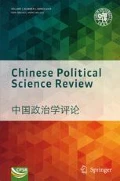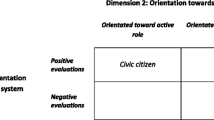Abstract
The political culture literature is afflicted with an orientational and attitudinal bias in which cultural dynamics reign supreme, while political values and beliefs are relegated as an epiphenomenon. The present article arrogates the ‘political’ as the superior analytical variable in estimating political culture in Pakistan. While political culture studies attend to the behavioural methodology focused on individual cultural attitudes and orientations towards the political system, analysis of Pakistan’s political culture is attempted at the meso-level, that is, political parties and is in this sense a top–bottom approach. A seminal focus on political parties attends to a major gap in the political culture literature: the non-attention to agency. That is, while the literature thrives on cultural attitudes and orientations that feed into the political system, it is largely silent on the much thornier question of how such attitudes and orientations are engendered in the public sphere in the first place. In this sense, the article attributes agency to political parties as shaping and influencing political culture, that is, how do people view and think about politics in the country. Finally, in conformity with the political culture literature, the fact that political culture is never uniform and homogenous rather stratified into various competing political sub-cultures is brought out with respect to three mainstream political parties in Pakistan as manifested in their 2018 election manifestoes. Because political parties are ideational agents that shape beliefs and values in the public sphere, it makes sense to deep dive into competitive political sub-cultures placing ‘politics’ at the core of political culture analysis.
Similar content being viewed by others
Notes
The omission of the new provinces demand from the PML-N manifesto was a consequence of the fact that as an incumbent party, it failed to take appropriate measures when in power. The non-steps indicate that despite elitist endorsement in theory, the practice of organising new provinces is still a long arduous path.
References
Ali, Murad. 2020. China-Pakistan Economic Corridor: prospects and challenges. Contemporary South Asia 28 (1): 100–112.
Almeida, Cyril. 2016. ‘Exclusive: Act against militants or face international isolation, civilians tell military.’ Dawn, October 6, https://www.dawn.com/news/1288350.
Almond, Gabriel A. and Sidney Verba. 1963. The Civic Culture: Political Attitudes and Democracy in Five Nations. Princeton: Princeton University Press.
Chak, Farhan Mujahid. 2014. Islam and Pakistan’s Political Culture. London: Routledge.
Cheema, Ali and Asim Ijaz Khwaja and Adnan Khan. 2005. Decentralization in Pakistan: Context, Content and Causes. KSG Working Paper No. RWP05-034. Available at SSRN: https://ssrn.com/abstract=739712 or http://dx.doi.org/10.2139/ssrn.739712.
Chilton, Stephen. 1988. Defining Political Culture. The Western Political Quarterly 41 (3): 419–455.
Daalder, Hans. 2002. Parties: Denied, Dismissed, or Redundant. In Political Parties: Old Concepts and New Challenges, ed. Richard Gunther et al., 39–57. Oxford: Oxford University Press.
Dalton, Russell J., and Doh Chull Shin. 2014. Reassessing the Civic Culture Model. In The Civic Culture Transformed: From Allegiant to Assertive Citizens, ed. Russell J. Dalton and Christian Welzel, 91–115. New York: Cambridge University Press.
Dalton, Russell J., David M. Farrell, and Ian McAllister. 2011. Political Parties and Democratic Linkage: How Parties Organize Democracy. Oxford: Oxford University Press.
Dawn. 2006, May 16. Text of the Charter of Democracy. https://www.dawn.com/news/192460.
Diamond, et al. 1987. Building and Sustaining Democratic Government in Developing Countries: Some Tentative Findings. World Affairs 150 (1): 5–19.
Dittmer, Lowell. 1977. Political Culture and Political Symbolism: Toward a Theoretical Synthesis. World Politics 29 (4): 552–583.
Duverger, Maurice. 1951. Political Parties. Paris: Librairie Armand Colin.
Eckstein, Harry. 1988. A Culturalist Theory of Political Change. The American Political Science Review 82 (3): 789–804.
Gishkori, Zahid. 2013. Bahawalpur South Punjab: New province bill sails through the Senate. The Express Tribune, March 7, https://tribune.com.pk/story/517000/bahawalpur-south-punjab-new-province-bill-sails-through-the-senate/.
Hayat, M.Nauman, Kaneez Fatima, Uzma Mukhtar, and Safia Bano. 2016. Economic Performance of Pakistan under Democracy and Military Regimes. Journal of Economics, Business and Management 4 (12): 690–694.
Huntington, Samuel P. 2004. Who Are We? The Challenges to America’s National Identity. New York: Simon and Schuster.
Hussain, Sajid, A.R. Sajid, and Shafiq Jullandhry. 2018. Politics-media-youth nexus: Analysis of Pakistan’s general elections 2013. Cogent Social Sciences 4: 1–14.
Ijaz, Aymen. 2017. Pakistan-India Relations under Prime Minister Modi’s Government (2014–16). IPRI Journal 2 (1): 74–94.
Inoguchi, Takashi, and Jean Blondel (eds.). 2012. Political Parties and Democracy: Contemporary Western Europe and Asia. New York: Palgrave Macmillan.
Islam, Muhammad. 2013. Religion and Political Development in Pakistan. Journal of South Asian and Middle Eastern Studies 36 (2): 70–90.
Jahan, Rounaq. 1972. Pakistan: Failure in National Integration. New York: Columbia University Press.
Janda, Kenneth. 2013. Do Party Systems Matter? Governance through Modern Political Parties. Harvard International Review 34 (4): 58–62.
Janda, Kenneth, and Jin-Young Kwak. 2010. Party System Effects on Country Governance: A Cross-National Analysis. Korean Political Science Review 45 (3): 7–41.
Katz, Richard S., and Peter Mair. 2002. The Ascendancy of the Party in Public Office: Party Organizational Change in Twentieth Century Democracies. In Political Parties: Old Concepts and New Challenges, ed. Richard Gunther et al., 113–135. Oxford: Oxford University Press.
Kennedy, Charles H. 2005. Pakistan in 2004: Running Very Fast to Stay in the Same Place. Asian Survey 45 (1): 105–111.
Khan, Adeel. 2005. Politics of Identity: Ethnic Nationalism and the State in Pakistan. New Delhi: Sage Publications.
Khan, Iftikhar. 2018. ‘PTI secures lead of four million votes over PML-N.’ Dawn, July 29, https://www.dawn.com/news/1423605.
Khan, Kamran Aziz. 2011. 2002 Elections in Pakistan: A Reappraisal. Journal of Political Studies 18 (1): 93–108.
La Palombara, Joseph, and Myron Weiner (eds.). 1966. Political Parties and Political Development. Princeton: Princeton University Press.
Linz, Juan J., and Arturo Valenzuela (eds.). 1995. The Failure of Presidential Democracy. Baltimore: Johns Hopkins University Press.
Malik, Anas. 2014. Pakistan in 2013: A Milestone in Democratic Transition. Asian Survey 54 (1): 177–189.
Manifesto 2018, Pakistan Muslim League (N), available at https://www.thenews.com.pk/assets/docs/PML-N-Manifesto-Booklet-min.pdf.
Michels, Robert. 1915. Political Parties: A Sociological Study of the Oligarchical Tendencies of Modern Democracy. Glencoe: The Free Press.
Mir, Shabbir. 2018. ‘G-B Order 2018 triggers protest in Gilgit.’ The Express Tribune, May 27, https://tribune.com.pk/story/1720017/1-g-b-order-2018-triggers-protest-gilgit/.
Monshupuri, Mahmood, and Amjad Samuel. 1995. Development and Democracy in Pakistan: Tenuous or Plausible Nexus? Asian Survey 35 (11): 973–989.
Mounk, Yascha. 2018. The People vs. Democracy: Why our Freedom Is in Danger and How to Save It. Cambridge, Massachusetts: Harvard University Press.
Niaz, Ilhan. 2016. Jinnah on Governance: The Unheeded Advice of Pakistan’s Quaid-i-Azam. Asian Affairs 47 (3): 406–427.
Pakistan People’s Party (PPP) Manifesto 2018, available at https://www.thenews.com.pk/assets/front/pdf/PPP_Manifesto_2018.pdf.
Pakistan Tehreek-e-Insaf (PTI) Manifesto 2018, available at https://insaf.pk/news/pti-launches-its-manifesto-2018.
Putnam, Robert D. 1971. Studying Elite Political Culture: The Case of “Ideology”. The American Political Science Review 65 (3): 651–681.
Putnam, Robert D. 1993. Making Democracy Work: Civic Traditions in Modern Italy. Princeton: Princeton University Press.
Pye, Lucian W. 1965. Introduction: Political Culture and Political Development. In Political Culture and Political Development, ed. Lucian W. Pye and Sidney Verba, 3–26. Princeton: Princeton University Press.
Pye, Lucian W. 1991. Political Culture Revisited. Political Psychology 12 (3): 487–508.
Rabbani, Mian Raza. 2011. A Biography of Pakistani Federalism: Unity in Diversity. Islamabad: Leo Books.
Rahman, Tariq. 1997. Language and Ethnicity in Pakistan. Asian Survey 37 (9): 833–839.
Rizvi, Hasan-Askari. 1984. The Paradox of Military Rule in Pakistan. Asian Survey 24 (5): 534–555.
Rizvi, Hasan-Askari. 2000. Military, State and Society in Pakistan. London: Macmillan.
Robinson, Simon. 2008. ‘Religion’s Defeat in Pakistan’s Elections.’ Time, February 29, http://content.time.com/time/world/article/0,8599,1718614,00.html.
Saleem, Faiza. 2017. The Disqualification of Nawaz Sharif: Implications for Democracy in Pakistan. ISAS Brief 503: 1–6.
Sartori, Giovanni. 1976. Parties and Party Systems: A Framework for Analysis. Cambridge: Cambridge University Press.
Shafqat, Saeed. 1997. Civil-military relations in Pakistan: From Zulfikar Ali Bhutto to Benazir Bhutto. Boulder: Westview Press.
Shafqat, Saeed. 1998. Democracy in Pakistan: Value Change and Challenges of Institution Building. The Pakistan Development Review 37 (4): 281–298.
Shah, S. 1994. Federalism in Pakistan. Islamabad: National Institute of Pakistan Studies.
Shah, Anwar. 2012. The 18th Constitutional Amendment: Glue or Solvent for Nation Building and Citizenship in Pakistan. The Lahore Journal of Economics 17(SE): 387–424.
Shah, Aqil. 2014. The Army and Democracy: Military and Politics in Pakistan. Cambridge: Harvard University Press.
Shah, Aqil. 2019. Pakistan in 2018: Theft of an Election. Asian Survey 59 (1): 98–107.
Siddique, Osama. 2006. The Jurisprudence of Dissolutions: Presidential Power to Dissolve Assemblies Under the Pakistani Constitution and its Discontents. Arizona Journal of International and Comparative Law 23 (3): 622–715.
Soherwordi, Syed Hussain Shaheed, and Shahid Ali Khattak. 2014. The Creation of New Provinces in Pakistan and its Implications for an Integrated Country. Journal of the Research Society of Pakistan. 51 (1): 139–155.
Somers, Margaret R. 1995. Narrating and Naturalizing Civil Society and Citizenship Theory: The Place of Political Culture and the Public Sphere. Sociological Theory. 13 (3): 229–274.
Stroschein, Sherrill. 2019. Populism, Nationalism, and Party Politics. Nationalities Papers: The Journal of Nationalism and Ethnicity 47 (6): 923–935.
Syed, Anwar H. 1978. Z.A. Bhutto’s Self-Characterizations and Pakistani Political Culture. Asian Survey 18(12): 1250–1266.
Syed, Anwar H. 1998. Pakistan in 1997: Nawaz Sharif’s Second Chance to Govern. Asian Survey 38 (2): 116–125.
Tanwir, Farooq. 2002. Religious Parties and Politics in Pakistan. International Journal of Comparative Sociology 43 (3–5): 250–268.
Wiarda, Howard J. 2014. Political Culture, Political Science and Identity Politics: An Uneasy Alliance. Burlington: Ashgate.
Willis, Jerry W. 2007. Foundations of Qualitative Research: Interpretive and Critical Approaches. London: Sage Publications.
Wolf, Siegfried O. 2017. An assessment of the latest premature end of Nawaz Sharif’s prime ministership. South Asia Democratic Forum Comment (97): 1–9.
Yamin, Saira. 2015. Pakistan: National Security Dilemmas and Transition to Democracy. Journal of Asian Security and International Affairs 2 (1): 1–26.
Zubair, Syed Sohaib, Nasira Jabeen, Yaamina Salman, Muhammad Zahid, and Sidra Irfan. 2019. Governance Context of Higher Education Sector of Pakistan. Journal of Pakistan Vision 20 (1): 1–13.
Zulfiqar, Saman. 2012. Politics of New Provinces in Pakistan: Prospects and Challenges. IPRI Journal 12 (2): 146–152.
Author information
Authors and Affiliations
Corresponding author
Ethics declarations
Conflict of interest
The author affirms that there is no conflict of interest.
Rights and permissions
About this article
Cite this article
Siddiqi, F.H. Political Parties as Transmitters of Political Culture: Competitive Party Dynamics and Political Sub-cultures in Pakistan. Chin. Polit. Sci. Rev. 5, 534–554 (2020). https://doi.org/10.1007/s41111-020-00155-0
Received:
Accepted:
Published:
Issue Date:
DOI: https://doi.org/10.1007/s41111-020-00155-0




